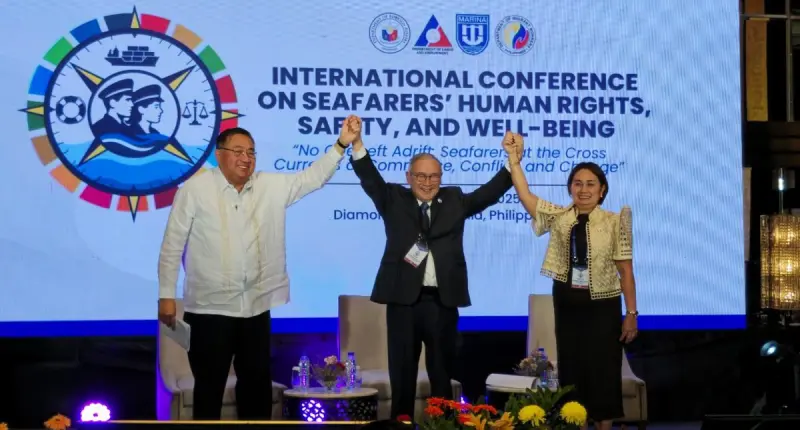A New Era for Seafarers’ Rights and Welfare
The maritime world is steering toward a pivotal moment as the Manila Declaration on Seafarers’ Human Rights, Safety, and Well-being takes center stage with the Philippines at the helm. This declaration is not just a set of nice words; it’s a serious call to action aimed at reshaping how governments, shipping companies, and international organizations safeguard those who keep global trade afloat. The importance of this move is as profound as the vast oceans these seafarers cross daily.
What Is the Manila Declaration?
Emerging from the recent International Conference on Seafarers’ Human Rights, Safety, and Well-being held in the Philippines, the Manila Declaration serves as a strategic framework. It highlights eight actionable and interconnected commitments designed to protect seafarers on the high seas, ensuring their dignity and safety are never compromised.
The Eight Core Commitments
| Commitment | Beschrijving |
|---|---|
| Uphold human rights at all times | Guaranteeing fundamental human rights of seafarers regardless of circumstance. |
| Fully enforce the Maritime Labour Convention | Ensuring that international labor standards on board ships are strictly followed. |
| Improve crisis preparedness | Enhancing readiness for emergencies affecting crews, including sudden incidents at sea. |
| Respect seafarers’ rights to refuse unsafe voyages | Allowing refusal to sail through high-risk areas without facing retaliation. |
| Promote corporate human rights due diligence | Encouraging companies to proactively respect and monitor human rights in maritime operations. |
| Foster inclusion and women empowerment | Supporting diversity and equal opportunities within the maritime workforce. |
| Ensure a just transition amid digitalization | Balancing technological progress with fair treatment of seafarers. |
| Harness international cooperation for maritime education and training | Collaborating globally to boost skills and knowledge in maritime professions. |
Global Backing and Significance
So far, ten nations, including the Philippines, Germany, United Kingdom, and New Zealand, have officially endorsed the declaration. This collective support signals a growing acknowledgment that the safety and rights of seafarers must not be an afterthought but a priority. Organizations, including human rights advocates at sea, are aligning themselves with this vision to stamp out abuse and neglect.
Why This Matters for Logistics and Shipping
The maritime sector is the backbone of global logistics, responsible for hauling goods ranging from everyday consumer products to bulky industrial cargo. The wellbeing of seafarers directly impacts the smooth flow of international freight and shipping operations. When crews are protected and treated fairly, delays decrease, safety incidents plummet, and supply chains strengthen. A robust, safe maritime workforce means a stronger logistics network that supports global trade.
Looking Ahead: Practical Implications in Shipping and Logistics
The implementation of these commitments could revolutionize how cargo is transported across oceans. Enhanced crisis management protocols mean contingency plans become the norm, reducing downtime during unforeseen events. Respect for seafarers’ rights to refuse unsafe passages translates to fewer hazardous disruptions. Moreover, corporate accountability and international cooperation promote a higher standard in shipping operations worldwide.
What This Means for You and Your Cargo
While policies and declarations offer a high-level roadmap for protecting seafarers, the real impact trickles down to day-to-day shipping realities. Every parcel, container, or bulky freight item relies on seafarers navigating complex maritime routes under safe, fair conditions. As the maritime workforce benefits from improved rights and protections, logistics become more reliable and efficient — a win-win situation for businesses and consumers alike.
Experience and Informed Choices with GetTransport.com
Even the most glowing recommendations can’t replace firsthand experience. When it comes to choosing the right cargo transportation, transparency and trust are key. Platforms like GetTransport.com empower users by offering the best shipping options at competitive rates worldwide. Whether moving office equipment, household items, vehicles, or heavy freight, users gain access to a versatile range of logistics services tailored to diverse needs.
With GetTransport.com, you tap into a global network that ensures your parcel or pallet is delivered smoothly, backed by reliability and affordability. The platform’s convenience and clear pricing structures help customers avoid surprises, making it easier to plan and manage shipments efficiently. Book your cargo transportation today and reap the benefits of seamless logistics.
Boek je vrachtvervoer met GetTransport.com
Samenvatting
The Manila Declaration marks a strong commitment by the Philippines and global partners to uplift seafarers’ rights, safety, and overall welfare. Through eight concrete commitments, it sets standards that promise to refine the maritime labor landscape and support a human-centered approach to shipping. The endorsement by multiple nations underscores the declaration’s growing influence on how cargo, freight, and logistics services operate worldwide. As the maritime industry continues to evolve, ensuring the welfare of those behind the wheel of global shipping remains essential.
GetTransport.com aligns perfectly with this vision by delivering reliable, affordable, and comprehensive cargo shipping solutions. Whether for international freight or local moves, the platform simplifies logistics challenges and bridges the gap between complex maritime operations and everyday transportation needs.

 Philippines Champions the Manila Declaration to Enhance Seafarers’ Rights, Safety, and Well-being Globally">
Philippines Champions the Manila Declaration to Enhance Seafarers’ Rights, Safety, and Well-being Globally">